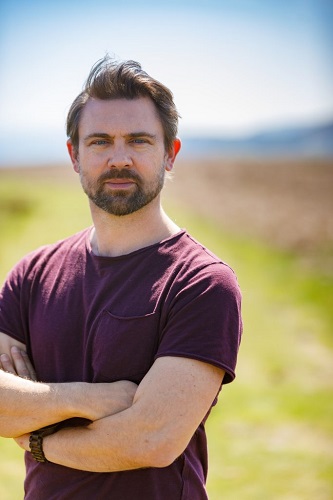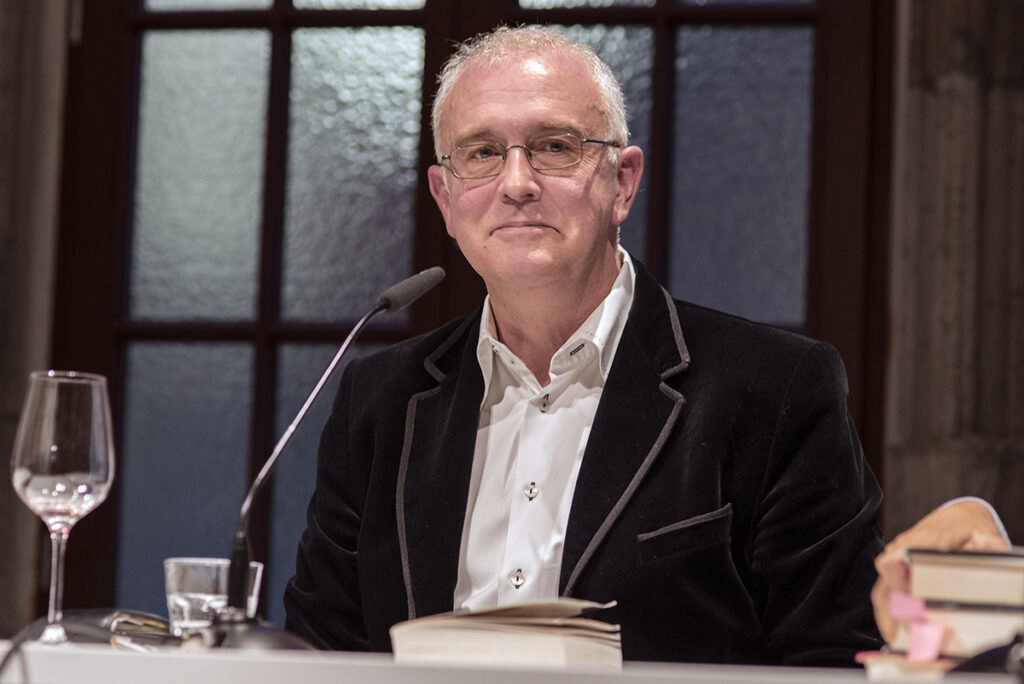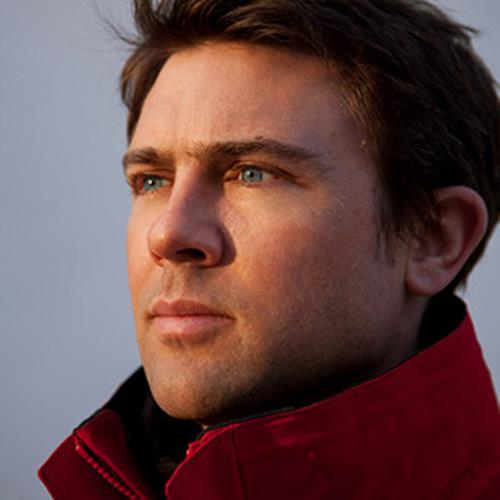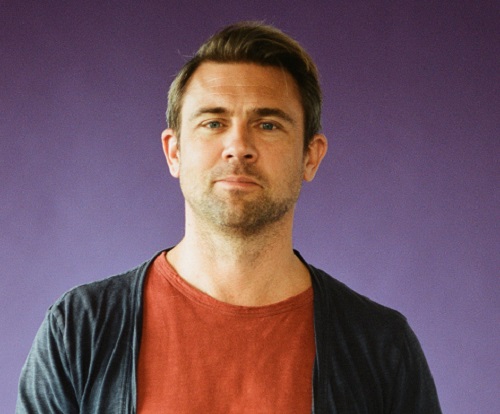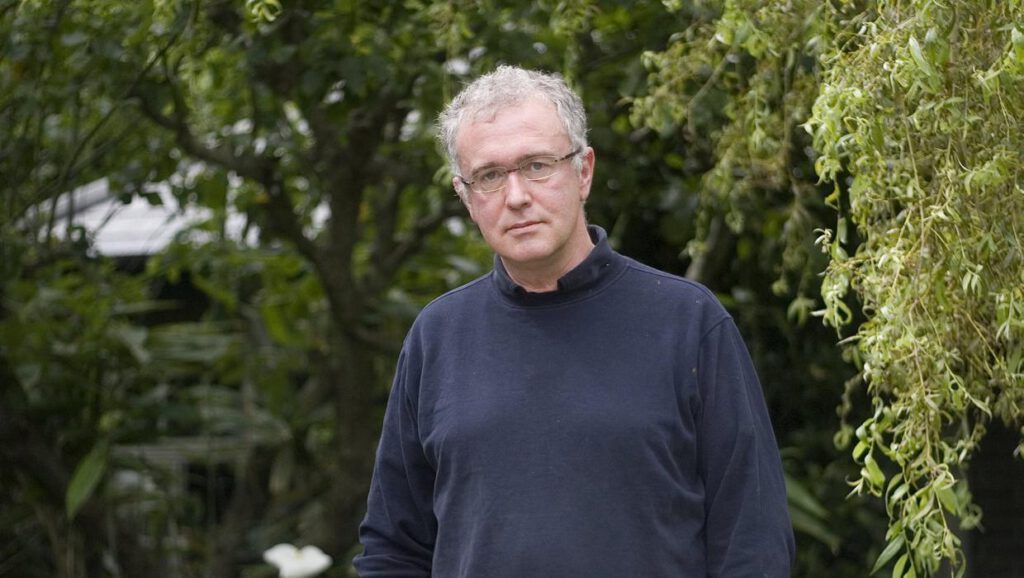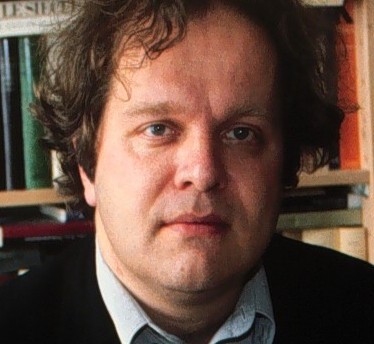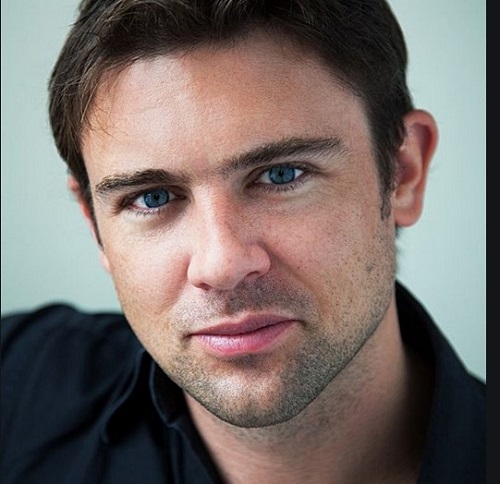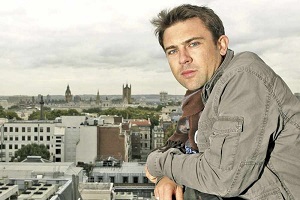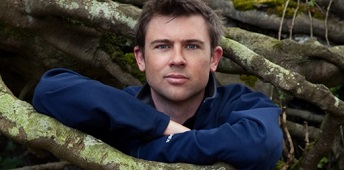Dolce far niente
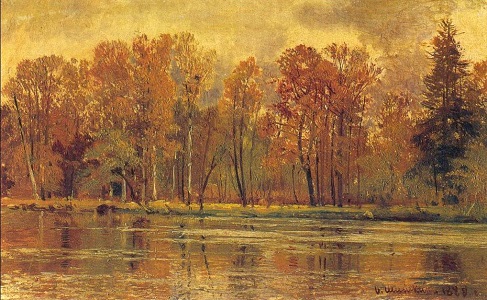
Indian Summer door Ivan Shishkin, 1888
Indian Summer
This is the sign!
This flooding splendour, golden and hyaline,
This sun a golden sea on hill and plain, —
That God forgets not, that He walks with men.
His smile is on the mountain and the pool
And all the fairy lakes are beautiful.
This is the word!
That makes a thing of flame the water-bird.
This mercy of His fulfilled in the magical
Clear glow of skies from dawn to evenfall,
Telling His Hand is over us, that we
Are not delivered to the insatiable sea.
This is the pledge!
The promise writ in gold to the water’s edge:
His bow’s in Heaven and the great floods are over.
Oh, broken hearts, lift up! The Immortal Lover
Embraces, comforts with the enlivening sun,
The sun He bids stand still till the day is won.
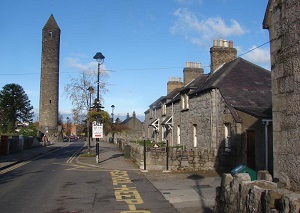
Katharine Tynan (21 januari 1861 – 2 april 1931)
Clondalkin, County Dublin, de gebooorteplaats van Katharine Tynan
De Engelse (Welshe) dichter, schrijver en presentator Owen Sheers werd geboren op 20 september 1974 in Suva op de Fiji eilanden. Zie ook alle tags voor Owen Sheers op dit blog.
The light fell
The weather was confused all day
so who can say why it was just then
the light fell that way –
the sun riding low, burnishing
for a minute, no more, the tops of the hills
against a curtain of cloud, ashen with rain and snow.
Or why it was then the deer chose to show their faces,
lift their heads from grazing, step near, pause
before coming on again.
Oh human life, mysterious,’ I heard a woman say,
‘not gone, oh no, not gone. There’s electrics you know.
I wouldn’t say it if I didn’t believe it to be so.’
And as the light fell drew our eyes, a thinning seam of amber
compressed between the land and sky,
I could believe it too.
That your guiding hand had motion still
and influence among these hills, to light the Crag and Michael’s Vale
just so, according to your will.
And as the soil hit the wood and the gathered crowd moved,
pressed arms, said what they could, wished well and farewell,
that it was just as much you as the still lowering sun
that threw one flank of the valley dark
and left the other lit,
to illustrate, as the land here always did,
what we’d but sensed within ourselves.
How at once and from the very same source,
a light could rise, as the same light fell.
Not Yet My Mother
Yesterday I found a photo
of you at seventeen,
holding a horse and smiling,
not yet my mother.
The tight riding hat hid your hair,
and your legs were still the long shins of a boy’s.
You held the horse by the halter,
your hand a fist under its huge jaw.
The blown trees were still in the background
and the sky was grained by the old film stock,
but what caught me was your face,
which was mine.
And I thought, just for a second, that you were me.
But then I saw the woman’s jacket,
nipped at the waist, the ballooned jodhpurs,
and of course the date, scratched in the corner.
All of which told me again,
that this was you at seventeen, holding a horse
and smiling, not yet my mother,
although I was clearly already your child.
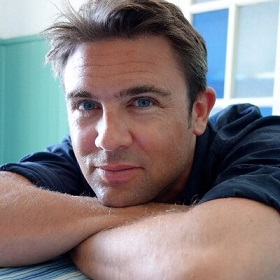
Owen Sheers (Suva, 20 september 1974)
De Ierse schrijver Joseph Victor O’Connor werd geboren op 20 september 1963 in Dublin. Zie ook alle tags voor Joseph O’Connor op dit blog.
Uit: The Thrill of it All
“Let me tell of someone I first saw in October 1981 when both of us were aged 17. An exasperating and charming and fiercely intelligent boy, the finest companion imaginable in a day of idleness and disputation. His name was Francis Mulvey.
So many symphonies of inaccuracy have been trumpeted about Fran down the years that I find myself reluctant to add to the chatter. Unauthorised biographies, a feature-length documentary, profiles and fanzines and blog-sites and newsgroups. My daughter tells me there’s talk of a biopic movie with the Thai actor Kiatkamol Lata as Fran, but somehow I can’t see that working. She wonders who’d play her daddy. I tell her not to go there. Fran wouldn’t want me included in his story anymore. And he’s lawyered-up good, as I know to my cost.
These days my former glimmertwin is private, characterised by the media as a ‘reclusive songwriter and producer’, as though ‘recluse’ is a job description. You’ve seen the most recent photograph available — it’s blurry and six years old. He’s with his children, attending the first Obama inauguration, sharing a joke with the First Lady. I barely recognise him. He looks trim, fit and prosperous, in a tux that cost more than my houseboat.
But the boy Fran, in his heart, was a demimonde figure, more comfortable in a second-hand blouse rummaged in a charity store in Luton, the town where the fates introduced us. I think of it as my only hometown, the place I grew up, but by literal definition we were immigrants. I was born in Dublin, the middle child of three. In 1972 – the year I turned nine – we moved to England following a family tragedy. I had happy times and tough ones. There was a lot of non-event, as we marched to our own little humdrum. I tend to divide my youth into before and after Fran. The former I recollect as a series of monochromes. Luton got colour when he came.
I’m told he no longer wears makeup, not even a dusting of rouge. When I first encountered Francis, in college in the ‘80s, he would pitch up for lectures sporting more lip-frost and blusher than Bianca Jagger at Studio 54.
I became aware of him during my first month at the Polytechnic. He would have been difficult to miss. One morning I saw him upstairs on the 25 bus, asking the loan of a compact-mirror from the unsmiling conductress, a Jamaican lady of about fifty who was not a believer in light-touch regulation when it came to Luton’s scholars. On supplying the mirror, she was then beseeched for a tissue, onto which he imprinted a lipstick kiss before handing both items back to her.”
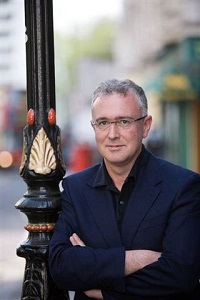
Joseph O’Connor (Dublin, 20 september 1963)
De Amerikaanse dichter en schrijver Donald Hall werd geboren in Hamden, New Haven County, Connecticut op 20 september 1928. Zie ook alle tags voor Donald Hall op dit blog. Donald Hall overleed op 23 juni jongstleden op 89-jarige leeftijd.
For An Early Retirement
Chinless and slouched, gray-faced, and slack of jaw,
Here plods depressed Professor Peckinpaugh,
Whose verse J. Donald Adams found “exciting.”
This fitted him to teach Creative Writing.
Apology For Old Clothes
Cerulean tweed jacket, twenty years old, that blueprints
the pitch of my shoulders … Cardigan out at the elbows —
comfortable, unkempt,
familiar as memory’s attic after fifty years of collecting …
I wear a shabby house,
as the lazy turtle does, disreputable and easy, dozing
in mud all winter.
Adultery At Forty
At shower’s head, high over the porcelain moonscape,
a waterdrop gathers itself darkly, with hesitation —
hangs, swells, shakes, looms,
as if uncertain in which direction to hurl itself —
and plunges
to come apart at its only destination.
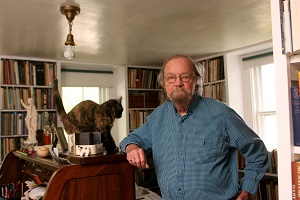
Donald Hall (20 september 1928 – 23 juni 2018)
De Spaanse schrijver Javier Marías Franco werd op 20 september 1951 in Madrid geboren. Zie ook alle tags voor Javier Marías op dit blog.
Uit: Your Face Tomorrow. Poison, Shadow and Farewell (Vertaald door Margaret Jull Costa)
“How else explain why it is that in a fire at a theater or a disco more people are crushed or trampled to death than burned or asphyxiated, or why when a ship sinks there are people who don’t even wait for the lifeboat to be full before lowering it into the water, just so that they can get away quickly and without being burdened by other passengers, or why the expression “Every man for himself” exists, which, after all, means discarding all consideration for others and reverting to the law of the jungle, which we all accept and to which we return without a second’s thought, even though we’ve spent more than half our lives with that law in abeyance or under control. The reality is that we’re doing violence to ourselves by not following and obeying it at all times and in all circumstances, but even so we apply that law far more often than we acknowledge, but surreptitiously, under cover of a thin veneer of civility or in the guise of other more respectful laws and regulations, more slowly and with numerous detours and stages along the way, it’s all very laborious but, deep down, it’s the law of the jungle that rules, that holds sway. It is, think about it. Among individuals and among nations.’
Tupra had used the English equivalent of ‘Sálvese quien pueda,’ which means literally ‘Save yourself if you can,’ whereas ‘Every man for himself denotes perhaps even fewer scruples: let each man save his own skin and worry only about himself, save himself by whatever means are available to him, and let others look after themselves, the weaker, the slower, the more ingenuous and the more stupid (and the more protective, too, like my son Guillermo). At that moment, you can allow yourself to shove and trample and kick others out of the way, or use an oar to smash in the head of anyone trying to hold onto your boat and get into it when it’s already sliding down into the water with you and yours inside it, and there’s no room for anyone else, or you simply don’t want to share it or run the risk of capsizing.
The situations may be different, but that commanding voice belongs to the same family or type as three other voices: the voice that issues an instruction to fire at will, to slaughter, to beat a disorderly retreat or to flee en masse; the one that orders to shoot at close range and indiscriminately whoever you happen to see or catch, the voice urging us to bayonet or knife someone, to take no prisoners, to leave not a soul alive (‘Give no quarter,’ is the command, or worse ‘Show no mercy’); and the voice that tells us to fly, to withdraw and break ranks, pêle-mêle in French or pell-mell in its English form; soldiers fleeing en masse when there are not enough escape routes to flee alone, each listening only to his own survival instinct and therefore indifferent to the fate of his companions, who no longer count and who have, in fact, ceased to be companions, even though we’re all still in uniform and feel, more or less, the same fear in that shared flight.”
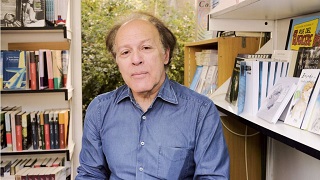
Javier Marías (Madrid, 20 september 1951)
De Amerikaanse schrijfster Hanya Yanagihara werd geboren op 20 september 1975 in Los Angeles. Zie ook alle tags voor Hanya Yanagihara op dit blog.
Uit: The People in the Trees
“I was born in 1924 near Lindon, Indiana, the sort of small, unremarkable rural town that some twenty years before my birth had begun to duplicate itself, quietly but insistently, across the Midwest. By which I mean that the town, as I remember it, was exceptional only for its very lack of distinguishing details. There were silos, and red barns (most of the residents were farmers), and general stores, and churches, and ministers and doctors and teachers and men and women and children: an outline for an “American society, but one with no flourishes, no decoration, no accessories. There were a few drunks, and a resident madman, and dogs and cats, and a county fair that was held in tandem with Locust, an incorporated town a few miles to the west that no longer exists. The townspeople–there were eighteen hundred of us–were born, and went to school, and did chores, and became farmers, and married Lindonites, and began families of their own. When you saw someone in the street, you’d nod to him or, if you were a man, pull down the brim of your hat a bit. The seasons changed, the tobacco and corn grew and were harvested. That was Lindon.
There were four of us in the family: my father, my mother, and Owen and me. (1) We lived on a hundred acres of land, in a sagging house whose only notable characteristic was a massive, once-grand central staircase that long before had been transformed by generations of termites into a lacy ruin.
About a mile behind the house ran a curvy creek, too small and slow and behaviorally inconsistent to warrant a proper name. Every March and April, after the winter thaw, it would surpass its limitations and become a proper river, swollen and aggressive with gallons of melted snow and spring rain. During those months, the creek’s very nature changed. It became merciless and purposeful, and seized from its outgrown banks tiny, starry bloodroot blossoms and wild thyme by their roots and whisked them downstream, where they were abandoned in the thicket of a dam someone unknown had built long ago. Minnows, the creek’s year-round inhabitants, fought upstream and drowned. For that one season, the creek had a voice: an outraged roar of rushing water, of power, and that narrow tributary, normally so placid and characterless, became during those months something frightening and unpredictable, and we were warned to keep away”
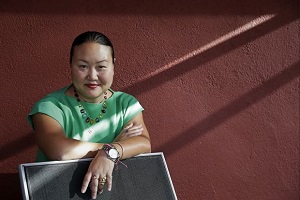
Hanya Yanagihara (Los Angeles, 20 september 1975)
De Vlaamse schrijver Cyriel Buysse werd geboren op 20 september 1859 in Nevele. Zie ook mijn blog van 20 september 2007. Zie ook alle tags voor Cyriel Buysse op dit blog.
Uit: Van hoog en laag. Het eerste levensboek
“De graaf en de baron waren de machtig-rijke, maar niet hardvochtige heersers over ’t nederig dorpje. Alles was van hen: de landen, de boerderijen, de huizen; doch zij waren geen tirannen: zij heersten rustig en beschermend zelfs, tevreden als alles goed ging in de gemeente en niemand hen dwarsboomde.
Alles ging goed wanneer eenieder bijtijds zijn pachten betaalde, geen politieke strijd in ’t dorp verwekte, geregeld naar de kerk ging en verder aan beide voorname families de nodige eerbied bewees. De baron was burgemeester van de gemeente, omdat hij meer verstand had van bestuurszaken dan de graaf, maar was de baron dat niet geweest, dan zou de graaf het wel geworden zijn, omdat het nu eenmaal wenselijk is, dat óf een graaf, óf een baron, als die er zijn, deze waardigheid op een dorp bekleedt.
De mensen leefden klein en nederig, maar niet ongelukkig, onder die heerschappij, en als het ware in de schaduw van de twee regerende kastelen. Misschien hadden zij wel, diep in hun binnenste, een vage drang naar meer vrijheid; misschien voelden zij, onbewust, een benauwende drukking, welke uitging van die machtige kastelen en kregen zij ook wel de indruk, dat men ruimer ademde in dorpen waar er geen kastelen waren; maar dat uitte zich toch nooit in klachten of verzuchtingen, dat lag stil in hen, als iets dat bij hun leven hoorde en niet kon veranderd worden. Feitelijk was er op Meulegem een andere atmosfeer en zagen de mensen er ook anders uit, dan in dorpen die geen kastelen hadden. Het was als iets onzichtbaars en toch alomtegenwoordigs, dat in voortdurende drukking over alles hing. De brouwer, de stoker, de steenkolenhandelaar en kruidenier waren er andere mensen dan hun confraters uit ’t omliggende. De dorpsschoolmeester was een ander mens en ook de gemeentesecretaris was een ander mens. Zelfs de kleine kinderen waren anders. Het uitgaan van de school te Meulegem was verschillend met het uitgaan van de school in andere dorpen; en iets wat de ganse bevolking kenmerkte en algemeen bekend was in de omtrek, was dat zij allen, jong en oud, er enigszins gebogen liepen, alsof een last hen op de schouders drukte. Het was spreekwoordelijk in de streek: wanneer iemand zich niet goed recht hield, zei men, ietwat geringschattend-spottend:
– Komt ge misschien van Meulegem?
En de enige, behalve de leden van de twee adellijke families, die daar niet van Meulegem kwam, was meneer de pastoor, die er glunderde en tierde en regeerde, één met de graaf en de baron, de geestelijke almacht naast en zelfs boven de wereldlijke, want én de graaf, én de baron behandelden hem als een gelijke en wel eens als een meerdere, die altijd met hen samenwerkte tot het vast-onwankelbaar instandhouden van wat door lange jaren van overgeleverde traditie ‘het’ leven zelf van Meulegem geworden was.”
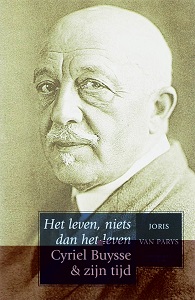
Cyriel Buysse (20 september 1859 – 25 juli 1932)
Cover
De Duitse dichter, schrijver en essayist Adolf Endler werd geboren op 20 september 1930 in Düsseldorf. Zie ook alle tags voor Adolf Endler op dit blog.
Uit: Nebbich – Eine deutsche Karriere
“Gespielt hab ich mit Bombensplittern. Günter Grass Bücher, halb verbrannt, angekohlt, feucht, verdreckt: »Vom Kaiserhof zur Reichskanzlei, Deutsche Frauen, deutsche Treue, Der Gasmann, Reiter in deutscher Nacht.« – Mit elf, mit zwölf hat E. Bomben- und Flaksplitter gesammelt und getauscht gleich Rühmkorf oder Wosnessenski, die es beide für mitteilenswert hielten.
Als er 13 Jahre alt wurde, war E. zum Sammler von Broschüren und Büchern geworden, wie sie nach jedem Luftangriff verwaist in den schwelenden Trümmern herumgeflattert sind. (Nein, E. ist kein Feind der Bomberpiloten gewesen, die Vokabel »Terrorangriff«, wiewohl dem Vorgang gerecht, ist nie über seine Lippen gekommen, erkannt als Nazi-Ausdruck.
Schon 1941 war das Kind – unklar die Gründe – in Gedanken zu jenen übergelaufen, die BBC London oder Radio Moskau hießen, schon das klirrende Strüppicht »Stalingrad«, das ist gewiß, hat es mit den Augen der Alliierten gesehen und bewertet.) Was nur hat der aufgeregt sammelnde Knabe von den Büchern gehalten, die er zu Dutzenden, zu Hunderten aus den Schuttbergen Düsseldorfs gebuddelt hat – wie manchmal auch Leichen –, von süßlichem Kalkgeruch umschwärmt?, sind sie ihm vor allem Kuriositäten gewesen?
Immer wieder wurden die Bücher gezählt, immer wieder neue Titel-Listen verfaßt, als gelte es, der Um- oder Nachwelt Kunde zu geben von etwas Merkwürdigem: »Die Helden von Scapa Flow, Blitzkrieg in Polen, Nacht über Malmaison, Mit der Leibstandarte im Westen, Orlog und Safari, Feldpostblüten, Narvik.« Gezählt und gezählt, als wäre das da, aufgestapelt im Kohlenkeller, ein kostbarer Schatz gewesen: »Deutsche am Nanga Parbat, Von der Maas bis an die Memel, Alle Wasser Böhmens fließen nach Deutschland.
« Manche der Bücher mußten auf dem Hängeboden getrocknet, manche neu zusammengeklammert, zusammengeklebt werden, nicht wenige blieben Halboder Viertelbücher, und alle sind nun dahin, dahin … Erhalten haben sich Reste der Listen, halb verbrannt, angekohlt, feucht, verdreckt, Zeugnisse des Beginns einer Sammler- Karriere der anderen Art.”
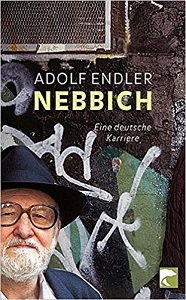
Adolf Endler (20 september 1930 – 2 augustus 2009)
Cover
Zie voor nog meer schrijvers van de 20e september ook mijn blog van 20 september 2017.
